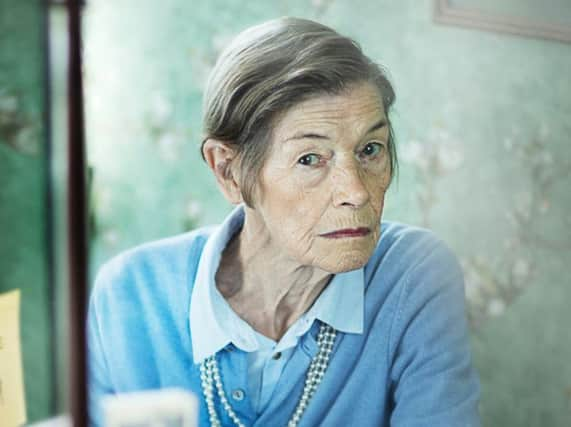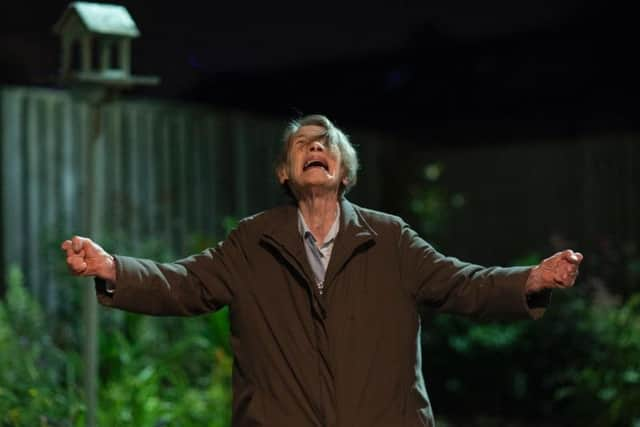Dealing with dementia is still down the political ladder, says Glenda Jackson ahead of starring role in new drama Elizabeth is Missing


The 83-year-old vividly remembers witnessing how these “terrible illnesses” wreak havoc upon people and their family and friends.
She remembers meeting a man and his daughter, “and he had been abusive and shouting”, recalls the formidable octogenarian, whose most famous roles include Seventies films Women In Love and A Touch Of Class.
Advertisement
Hide AdAdvertisement
Hide Ad

“She said to me, ‘Never in my life did he raise his voice to me; never once did I see him like this’. And it is that that struck me most markedly, because we all have those people inside us.”This month sees Jackson play Maud, a woman with dementia, for moving new BBC drama Elizabeth Is Missing.
The feature-length adaptation follows the determined grandmother’s mission to discover what’s happened to her friend Elizabeth, who has suddenly disappeared. Flashbacks are cleverly woven into the plot, detailing another unsolved mystery – what happened to Maud’s sister, who went missing when she was a teenager?
It’s heart-breaking, but also poignantly humorous, as Maud tries to discover the fate of both women before dementia results in the clues being lost to her forever. We also see the impact the disease has on her family, particularly daughter Helen (Helen Behan) and granddaughter Katy (Nell Williams).
Advertisement
Hide AdAdvertisement
Hide AdNotably, the one-off film – based on the bestselling 2014 novel by Emma Healey – is Jackson’s first appearance on our screens in 27 years. One piece of research the two-time Academy Award winner found particularly helpful before taking on the role was speaking to a doctor who works with the charity Dementia UK.
“I said to her, ‘What is it that causes this woman who, in her pre-illness life, is living seemingly quite roundly, and suddenly there are these excessive outbursts of rage?’” she notes on forming the character of Maud. The doctor said, ‘It’s frustration’. Which she actually says in the script: ‘I’ve got all these feelings, but I can’t let them out’.”
How challenging was Elizabeth Is Missing compared to previous projects? “I’m very subjective when I see a film for the first time,” muses the mother-of-one, who had son Daniel, a newspaper columnist, with her former husband, Roy Hodges.
“I tend to sit there and castigate myself and say, ‘Why in the name of all that’s holy did you choose to do that?’ – I don’t mean the subject, I mean my choices in acting. And that, over the many years I’ve been doing this, hasn’t changed one iota.
Advertisement
Hide AdAdvertisement
Hide Ad“But I must say it is a privilege to be offered work, because to be dealing with something that’s so fascinating and important as this, and to work with these kinds of people... talk about cherry on the top of the cake.”
Not only did Jackson think the script was “remarkable”, the role appealed because it explores an issue she has been “banging on about for at least a decade”. “We are living longer, and this is a deep black hole, which none of the political parties has really taken on board.”
She adds passionately: “Services are not being properly financed; how one deals with this illness, as a society, is still fairly down the political ladder, and we’re going to have to face this fact.
Advertisement
Hide AdAdvertisement
Hide Ad“And it’s not just our society, it’s all Western democracies, it seems to me, because we are living longer, but how are we going to pay for it? And that’s something which we, as a society, are going to have to accept.”
The early life of Jackson, who was named after mother’s favourite film star, Glenda Farrell, is well documented – she was the eldest of four daughters, born in Birkenhead, her father a builder, her mother a cleaner.
The young Glenda won a scholarship to West Kirby Grammar School for Girls. She left with her School Certificates in just three subjects, and went to work on the laxatives and bilious counter at Boots.
Enthusiasm for amateur dramatics led her to apply to the Royal Academy of Dramatic Arts. Her first real break came in 1963 in the stage version of Alfie and she moved to the Royal Shakespeare Company the following year, working for the famous director Peter Brook.
Advertisement
Hide AdAdvertisement
Hide AdHe changed her into an erudite and assertive actress – just the sort Ken Russell was looking for to star in his film Women In Love. She was pregnant with her only child during much of the filming, but she continued, nude scenes and all – and was rewarded with her first Oscar.
Superstardom followed, The Music Lovers, Sunday Bloody Sunday on the big screen, and for the BBC, in 1970, Elizabeth R. She landed major roles in theatre, too, including Lady Macbeth, Cleopatra and Hedda Gabler.
It was in 1992 that Jackson became Labour MP for Hampstead and Highgate. An interest in politics, a friendship with the Kinnocks, and a hatred of Thatcherism combined to lead her to stand. The seat later became Hampstead and Kilburn, which she won at the 2010 general election with a majority of just 42.
She stood down from parliament in 2015, after deciding not to put herself forward for re-election. But the opinionated star is more than happy to discuss her political thoughts ahead of the general election, taking place on December 12.
Advertisement
Hide AdAdvertisement
Hide AdBrexit is the only thing the parties themselves seem to be concentrating on, she notes – even if the people of this country want to discuss issues which are not the UK leaving the EU. “I have a sneaking feeling that, once December 13 arrives, we’ll be in exactly the same position as we’re in now,” she states.
“But all the parties have actually, within their manifestos – with varying degrees of how it’s going to be funded – touched on social services, which, at least, is a step in the right direction. But it’s up to us really, as a society, to keep pushing for more reality as far as this is concerned.”
As Jackson points out, the problem is that looking after people with health issues such as dementia requires “training people who know what they’re talking about, and funding their training, and actually providing the care for the people who, at the moment, find it impossible to fund it for themselves”.
Advertisement
Hide AdAdvertisement
Hide Ad“We all know the stories about families who are having to sell the family home to be able to pay for someone to be cared for, and this, in itself, creates terrible dramas in families,” she continues sadly.
“So, it’s a big – as I’ve said more than once, and will continue to say – black hole for all of us, and we just have to be brave and find a candle and start working our way through it.”
Elizabeth Is Missing airs on BBC One on Sunday, December 8.